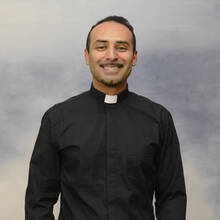The Importance of Curiosity to a Vocation
This Sunday’s first reading and Gospel passage illustrate a type of biblical narrative called a “call narrative.” These narratives appear throughout Scripture and share many features. The ones that appear in this Sunday’s readings include a setting during a time of crisis or a “transitional period” of history and the role of wisdom characters who provide formation and guidance. The most important feature in these call narratives, however, is the necessity of curiosity for growth in one’s faith.
Sacrifice or offering you wished not, but opened ears you gave me. (Ps 40:7)
How are you listening for God’s call today?
Is God guiding your community through a transition?
How can you maintain a healthy sense of curiosity to hear God’s call in your life?
In the Bible, the era between the “days of the judges” and the “days of the kings” was a transitional historical period. During the time of the judges, Israelites lived in scattered rural settlements and the nation was organized around family and tribal structures. In the days of the kings, by contrast, Israel was a centralized, urbanizing kingdom at the center of a vast trade network. This social upheaval is in the background of this Sunday’s first reading. Eli, the second-to-last of the judges, helps Samuel, his successor, hear God’s call. This call comes not just at a crisis point in history, but also at a transitional point in their relationship. A reference early in the narrative establishes this dynamic. At the shrine of God was a lamp that burned through the night. According to 1 Sam 3:3, God’s call came to Samuel “when the lamp of God was not yet extinguished.” This establishes the nighttime setting of Samuel’s call, and it also foreshadows an end to Eli’s ministry.
But the end of one age is not always a time of shadows. Eli still had much to teach Samuel about responding to God’s call. Likewise, this Sunday’s Gospel reading marks a transition from the age of the prophets to the age of the Messiah, as John the Baptist gives way to Jesus. “John was standing with two of his disciples, and as he watched Jesus walk by, he said, ‘Behold, the Lamb of God.’” (Jn 1:35-36). John the Baptist fulfills his own vocation by pointing out the “Lamb of God” and guiding his own disciples into Jesus’ service. They heard John but followed Jesus (Jn 1:37).
In this Sunday’s first reading and Gospel passage, there is a healthy sense of “vocational curiosity.” This quality helps one maintain a life of service to the Lord. Samuel goes to Eli repeatedly in response to God’s call. Eli, for his part, does not grow impatient with Samuel’s continuing intrusions, but reflects on them and is able to help Samuel understand their meaning. In this Sunday’s Gospel reading, Jesus sparks the vocational curiosity of the two disciples who wish to follow after him. “What are you looking for?” Jesus asks, to which they reply, “Rabbi, where are you staying?” (Jn 1:38). Jesus gives no direct answer, but only encourages their curiosity further, “Come, and you will see.”
Many today lament the state of vocations in the church, especially those to priesthood, marriage or religious life. Fewer and fewer people answer the call to these ways of life, and of those who do, even fewer persist. The vocational curiosity in this Sunday’s readings may be a helpful insight. Calls from God develop over time. Wisdom from mentors and from personal reflection, especially during our own “times of transition,” can help us in the development in our vocations, but a healthy curiosity can renew our wonder as we pursue God’s call.








